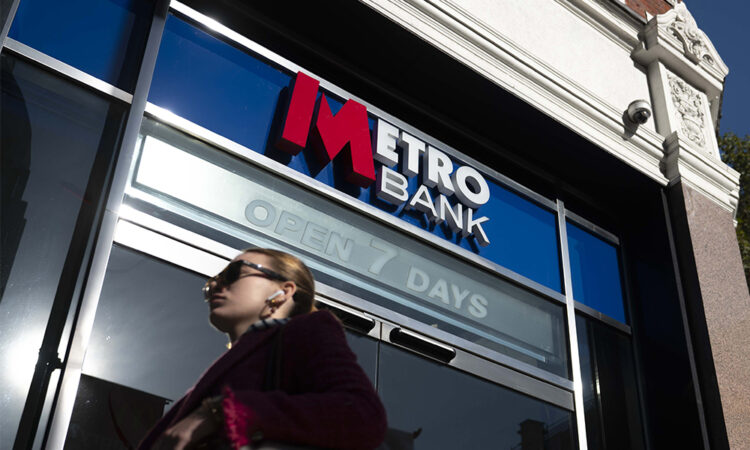
Market sentiment around the possibility of failures in the banking world remains as febrile as ever. Or so we might judge from coverage of Metro Bank – which reports suggested might have been edging towards collapse before finding a new owner over the weekend.
Metro was the brashest of the ‘challenger banks’ that sprouted after the 2008 financial crisis and the only one that aimed to build an all-new network of 200 branches. Its American founder, Vernon Hill – whose other interests included a chain of Burger King outlets – declared an urge to ‘make banking fun’ when the first Metro opened in Holborn in 2010, offering free lollipops and dog biscuits. For some observers, it looked too gimmicky to survive.
To have done so, having attracted 2.7 million customers in 76 branches despite a disastrous ‘accounting error’ in 2019, a change of leadership and the impact of Covid, is no small achievement. But it came with crippling cost ratios and a chronically weak balance sheet. Metro’s shares, once traded at £40, plunged to 35p last week as investors started to panic. A fire-sale of mortgage assets and a run on deposits might have followed if the Bank of England had not indicated it was urgently seeking a buyer for the whole bank, with Santander in the frame.
But that development was forestalled by a £325 million capital injection and a £600 million refinancing that forced bondholders to take losses but left a Colombian financier, Jaime Gilinski Bacal – a specialist in acquiring cheap bank assets and turning them to profit, we’re told – as controlling shareholder.
Bacal says he’s committed to ‘physical and digital banking underpinned by a focus on exceptional customer service’. But cost cuts loom and Metro’s business model still looks unstable. Meanwhile, short sellers and social media pundits continue their search for ‘bank crash’ stories – and high-street majors continue their closure programmes. The last best hope for traditional branch banking in the UK remains the gimmick-free but genuinely customer-friendly Handelsbanken of Sweden.
All over for Odey
Odey Asset Management is closing down and returning funds to clients under the eye of the Financial Conduct Authority, following allegations of sexual misconduct against founder Crispin Odey. The first lesson of this cautionary tale for corporate life is simple: behave yourself. The second must be never to cross the radar screen of the Financial Times’s formidable special investigations team led by Madison Marriage, scourge of the Presidents Club and the CBI before turning to Odey. Their short report on the closure of his $4 billion business ended with a reference to ‘the 20th woman to accuse him’, the groping episode concerned being the first he had actually admitted. The subliminal message of the piece is clear: ‘Once we’re on your case, we will never give up.’
Fraudster or dreamer?
Across the pond, everyone interested in financial drama is agog at the Manhattan trial of Sam Bankman-Fried, founder of the FTX cryptocurrency exchange, once valued at $32 billion, which collapsed last year.
Prosecutors say that the 31-year-old Bankman-Fried illegally diverted billions of FTX customer deposits into speculative investments, political donations and personal loans to himself and his team that could never be repaid. What’s not in contention is that FTX was chaotically run and lacking anything resembling what Bankman-Fried’s lawyer called ‘a fully built-out risk-management function’.
The defence case is that Sam (who has pleaded not guilty) was a maths genius with philanthropic aspirations who lost control of a business that grew far beyond his expectations, but that he also believed his use of its funds was all above board. The prosecution – aided by testimony from three FTX executives who have pleaded guilty – says he’s a sophisticated fraudster whose wealth and influence was all ‘built on lies’.
Let me not prejudge the case, other than to state that acquittals in high-profile US fraud trials are vanishingly rare, which is why the vast majority of defendants plead guilty and plea-bargain. And that if I wanted to construct a multibillion-dollar scam, I would certainly choose to do so in the lawless crypto arena that hypnotises so many gullible punters.
But if that sounds like negative bias, I look forward to reading a more balanced portrait of Bankman-Fried in a new book by Michael Lewis, Going Infinite: the Rise and Fall of a New Tycoon. Unchallenged master of financial storytelling ever since Liar’s Poker, his 1989 account of life as a Wall Street bond salesman, Lewis says: ‘I don’t think: hero, villain. I think: great character, interesting situation, lots to teach the reader.’ A promising starting point for another bestseller, no doubt; less persuasive for FTX customers parted from their life savings.
Losing the rail game
Already struggling with your Christmas present list and wondering what to give a past or present transport minister? If you can’t find any Ferrero Rocher chocs because they’re in short supply following the failure of the Turkish hazelnut crop, here’s a fun alternative: a board game called Ticket to Ride in which players collect cards that enable them to build railway lines between cities, winning higher points for longer connections.
In my first game, on the US version of the board, my tactic of rushing to build short links for which I had cards in hand (Omaha to Kansas City, for example) while dithering over the longer route (in this case, how to reach Houston, Texas, from Duluth on Lake Superior) made me the loser by a wide margin. The winner – strategically husbanding his resources, ignoring pressure from other players, finally laying down mighty coast-to-coast sweeps of track – was, naturally, a Frenchman.





